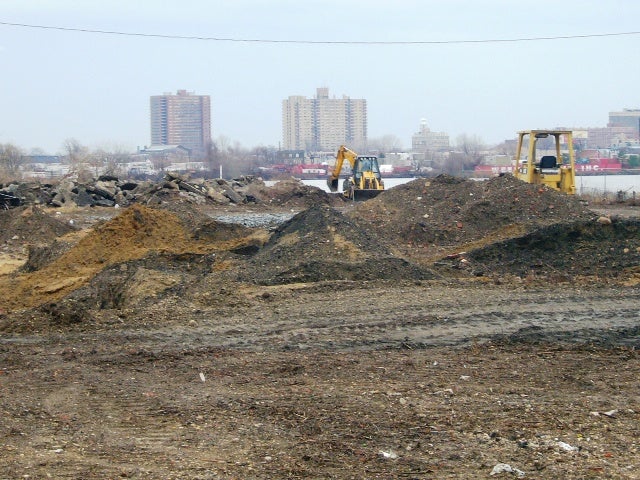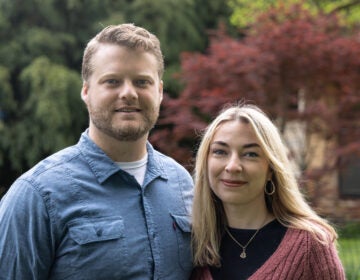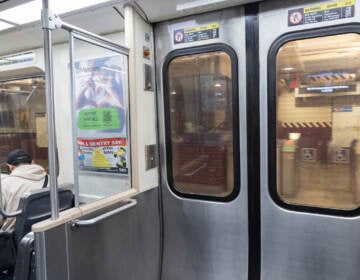Corps blesses earth moving at SugarHouse

Earth being moved Friday at SugarHouse site.
Jan. 11
By Kellie Patrick Gates
For PlanPhilly
The pre-construction work SugarHouse Casino has done on its site concerns the state commission charged with protecting history.
But the federal agency that has enforcement power is comfortable that work the casino has done will have no negative impact.
As they should be, said SugarHouse spokeswoman Leigh Whitaker. “The activity going on at the site – the work that we’ve been doing – is site prep work,” she said. This includes the removal of tree stumps and brush, but no grading. “We’re not doing anything wrong.”
Regardless of what has been done so far, the Pennsylvania Historical and Museum Commission wants all activity not related to archaeology to cease until after the completion of a historic review of the site – where the British once had a Revolutionary War fort. The PHMC sent an email to SugarHouse informing them of this stance on Monday.
“No one was happy that it was done,” said Kirk Wilson, spokesman for the PHMC. “But hopefully, there was no damage.”
Wilson said SugarHouse has removed trees and stumps and installed a silt fence – the ground-level screening often used to control erosion and sedimentation. “There might have been some work done to try to level the area – some grading – but we are not certain.”
The Commission says it cannot do anything to enforce its position, it can only ask the Army Corps of Engineers to do so. And the Army Corps of Engineers – the federal agency that issues the permit requiring the historic review, and the entity that enforces permit-related issues – says it has no problem with the work SugarHouse has done so far.
“Our biologist was out to the site today, and he’s comfortable with the work that’s going on there,” said Army Corps spokesman Khaalid Walls. “We’re ok with them doing work to an extent. As far as we know, they have not begun excavation or site grading.”
PlanPhilly went to the site at about 1:30 p.m. Friday and saw equipment moving large amounts of dirt around in the middle of the 22-acre site. When asked about it, Walls guessed that it might be related to the archeological dig, but said he would try to find out what was happening.
SugarHouse did not return calls for comment Friday, but told The Philadelphia Inquirer that they would not begin digging without the Historical and Museum Commission’s okay.Whitaker said SugarHouse plans to continue its current site preparation, and the Commission know this and has given its blessing.
“We are in constant communication with those offices, and the work we are doing is fine. It’s authorized, it’s permitted. We won’t do anything we don’t have permission to do.”
“That’s all that we want,” said Torben Jenk, a preservationist and amateur historian who lives near the site.
But Hilary Regan, a history buff and member of the Northern Liberties Neighbors Association – which opposes the proposed SugarHouse location – was not assuaged. “Their word doesn’t go very far with me right now,” she said. She believes they should not have been doing any work in the first place.
Earlier in the week, SugarHouse spokeswoman Leigh Whitaker said that “The activities taking place on the site are within the scope of valid, legal permits that were issued to us.” She also said, “We have permission from PHMC to continue current site activities.”
Douglas McLearen, head of the state Division of Archeology and Protection – a division of the Commission – went to Philadelphia Friday to look at the site. He was to determine what level of work has been done so far, and what damage, if any, might have occurred to the artifacts that might potentially be underground.
“Flattening the ground is one thing. Digging, depending on the depth, would be a problem,” Wilson said.
McLearen could not be reached Friday afternoon. Jenk said several weeks ago, he saw work at the sight that he thinks could endanger artifacts, but he had not seen anything of concern in the past two weeks.
Regan, who said she has received contradictory information about what is and what is not allowed at the site, would like “some clarification and reassurance of what’s going on.” She visits the site daily. “They have been moving dirt around,” she said. Maybe the machines are for archaeological purposes, she said, but she cannot be certain without more transparency on the part of SugarHouse and the regulatory agencies involved.
The Historical and Museum Commission is involved with SugarHouse because the casino hopes to build into the Delaware River. The federal Water Obstruction and Encroachment Permit is issued by The Army Corps of Engineers. Federal law requires a historical review as part of the process. In Pennsylvania, it is the Commission that advises the Corps on this review.
SugarHouse already has other permits.
On the last working day of the pro-casino Street administration, the city gave SugarHouse its rough grading permit – the one that allows site preparation. And the state Department of Environmental Protection issued the National Pollutant Discharge Elimination System permit, the one that allows the erosion prevention work.
Usually, this permit isn’t given until after the federal Obstruction and Encroachment Permit is issued. But SugarHouse asked to receive it ahead of time, and the DEP granted that request.
Both the rough grading permit and the NPDES permit came with caveats that caution the casino not to dig in historically sensitive areas without the blessing of the Pennsylvania Historical and Museum Commission.
DEP Assistant Regional Director John Kennedy said his office is not required to make sure an applicant has an agreement with the Museum and Historical Commission before issuing the NPDES, but it is the responsibility of the applicant to have such an agreement in place.
Kennedy said his department’s permitting staff person was at the SugarHouse site Thursday and “everything was in order. They followed the special conditions and made sure they were not in violation of any of the things we’ve warned them about.”
That would include not digging in historically sensitive areas, he said. But when asked how historically sensitive areas were defined, he said that would be between SugarHouse and the Museum and Historical Commission.
A group of local historians and history buffs – including Jenk and Regan – have been watching the on-going work at the site and feared that what they saw could ruin any chance of finding evidence of British Fort No. 1 and the Lenape. The Nanticoke Lenni-Lenape Tribal Council reviewed the situation at their meeting earlier this week and determined that the SugarHouse site is a “location of concern”.
These were the individuals who pressured the state and federal agencies to make certain SugarHouse does not dig until after the historic review is complete.
They and others who want the casinos to be built elsewhere or not at all have also put pressure on the Nutter administration, which is conducting a review of all casino-related decisions, but will not act on any single action – such as the rough grading permit – until the review is complete.
Regan wants the city to hold public hearings both on how the permits were issued and the archeological potential for the site.
SugarHouse says the timing of the permits was coincidental – the State Supreme Court had only recently affirmed the developer’s right to the zoning that allows for casinos, and that was needed for SugarHouse to get its zoning permit, which in turn cleared the way for the rough grading permit.
The skeptics are suspicious. Regan wants the review process to be public because “it’s the fox guarding the henhouse if they allow the same agency to review the permit that may have erroneously issued it in the first place,” she said.
Brian Abernathy, spokesman for City Councilman Frank DiCicco, whose district contains the casino site, said his office had not received a request for hearings. He is also not certain they would accomplish anything.
“The historical issues clearly fall under state purview,” he wrote in an email. “From my understanding, the State is acting appropriately on the matter and doing what they can to protect any archeological evidence that may exist.”
So far as the issuance of the city permits goes, “we’re working closely with the Nutter Administration in their review. We’re confident that the Administration is taking the appropriate steps.”
Lastly, Abernathy wrote, Council’s calendar would not allow for any hearings until February. “Our hope is to have the permitting issues resolved by that time.”
SugarHouse gets license
In other casino-related news, SugarHouse Casino’s developers announced Friday evening that the state’s Gaming Control Board had issued its slot machine license.
“Today marks another important step in the process of building a world-class gaming and entertainment facility,” said Bob Sheldon, President of HSP Gaming, LP.
“We are very excited that we are moving forward in our development process and we look forward to the day when we can begin hiring people for the 1,100 permanent jobs our project will create and start generating much needed tax revenue for the City of Philadelphia and the Commonwealth of Pennsylvania.”
The license, which has an expiration date of Jan. 10, 2009, states that HSP has met all the conditions established by law, and so the Board authorizes it to “place and operate slot machines at a licensed facility for gaming purposes”
Spokeswoman Leigh Whitaker said the license was expected, since SugarHouse paid its $50 million fee in October.
Brian Abernathy, spokesman for City Councilman Frank DiCicco, who does not want SugarHouse to open at its proposed site, said the license was “not a big deal, because they can’t operate a casino without a building” and SugarHouse does not have all the permits it needs to construct a building.
Not everyone took the news so lightly.
“I’m very shocked that the gaming control board took such steps to expedite the issuance of an operator license when the operator doesn’t have the ability to build the facility nor do they have control of the site,” said Mary Isaacson, spokeswoman for Rep. Michael O’Brien, whose district contains the site.
Christopher Craig, legal counsel to Sen. Vince Fumo and author of the act that governs casinos, said the issuance is “not conforming with the act. The act says in order to receive the license, they have to satisfy all the conditions of licensure.”
The license states that SugarHouse has done that, but Craig disagrees.
“They have no building, no plumbing, no water, no heat, no computers – how can they satisfy the conditions the facility needs to operate?”
Both Fumo and O’Brien are involved in legal battle with SugarHouse and the Philadelphia Commerce Department, because the Commerce Department gave SugarHouse the right to build on riverbed lands, also called riparian lands. The legislators contend that only the General Assembly can grant these rights. The unresolved battle is part of why Isaacson and Craig say SugarHouse does not control the site.
Craig said he knows of no other casino in the state that has received its operating license before at least starting construction.
The expiration date of the license means SugarHouse has until next January to be up and running, he said. If that doesn’t happen, the Casino will need to apply for an extension.
***
Casino-Free Philadelphia plans to spend Saturday visiting SugarHouse and Foxwoods investors – and their neighbors – in Gladwyne and Narberth.
It’s the investors who really have the power to decide whether to move or stop the casinos, said Casino-Free co-founder Daniel Hunter. Most of the time, he said, members will be talking to investors’ neighbors, trying to get them to convey a message that casinos are not good for neighborhoods.
As for the investors themselves, Casino-Free has already sent them letters and received no response. “I don’t think they’re excited to meet us,” he said. “But we’re excited to meet them.”
WHYY is your source for fact-based, in-depth journalism and information. As a nonprofit organization, we rely on financial support from readers like you. Please give today.






